International Business: Routes, Barriers & Decision-Making in SASOL
VerifiedAdded on 2023/06/05
|10
|3218
|237
Report
AI Summary
This report examines the global business environment and its impact on companies like SASOL, focusing on internationalization, corporate governance, leadership, and cultural influences. It analyzes the ethical and sustainable factors in global markets, evaluates barriers to international business, and provides recommendations to overcome them. The report also explores different decision-making approaches in a global context and articulates various routes to internationalization, including exporting, joint ventures, licensing, and franchising, while addressing key barriers. Models like McKinsey's 7S and Hofstede's cultural dimensions are applied to understand the internal and external factors influencing SASOL's operations in the global market.
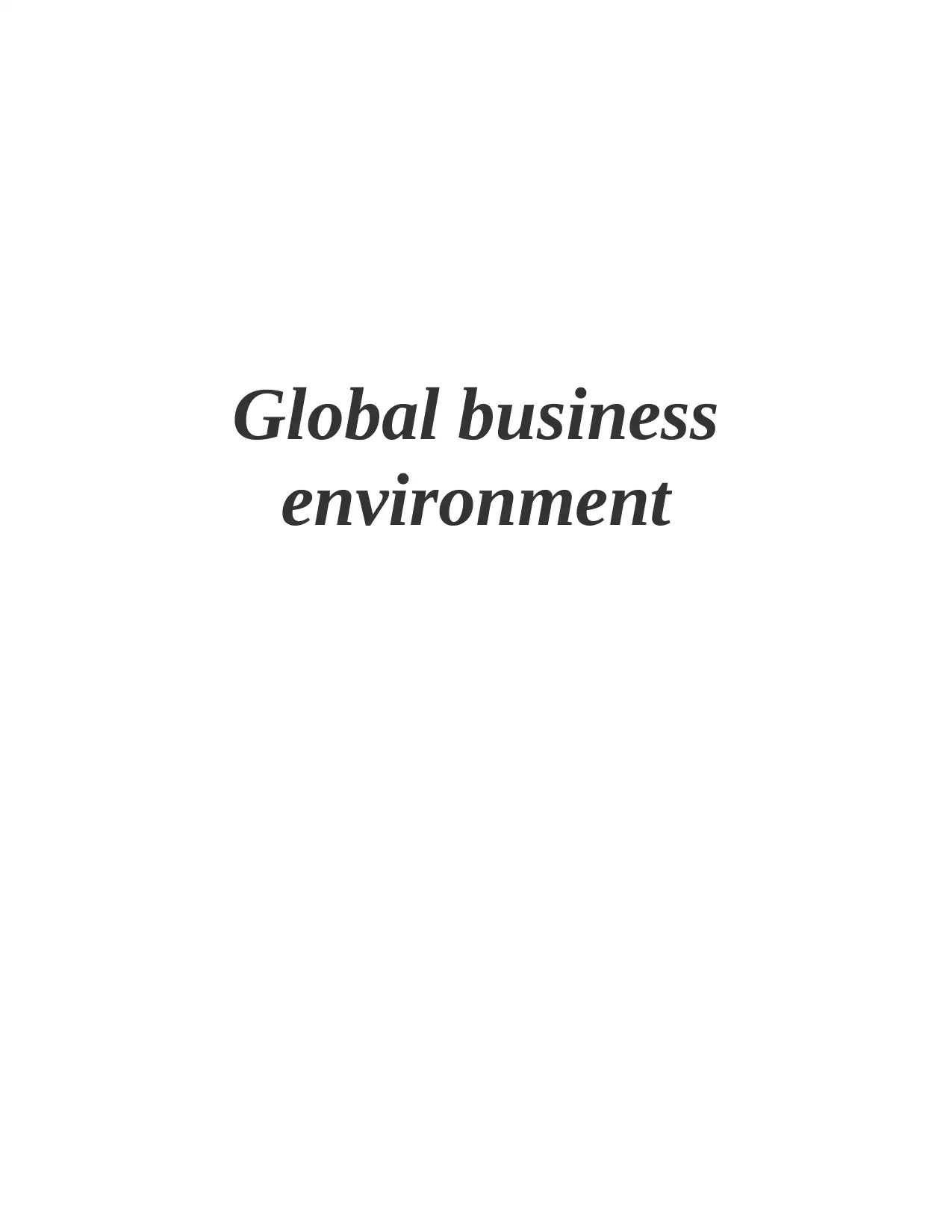
Global business
environment
environment
Paraphrase This Document
Need a fresh take? Get an instant paraphrase of this document with our AI Paraphraser
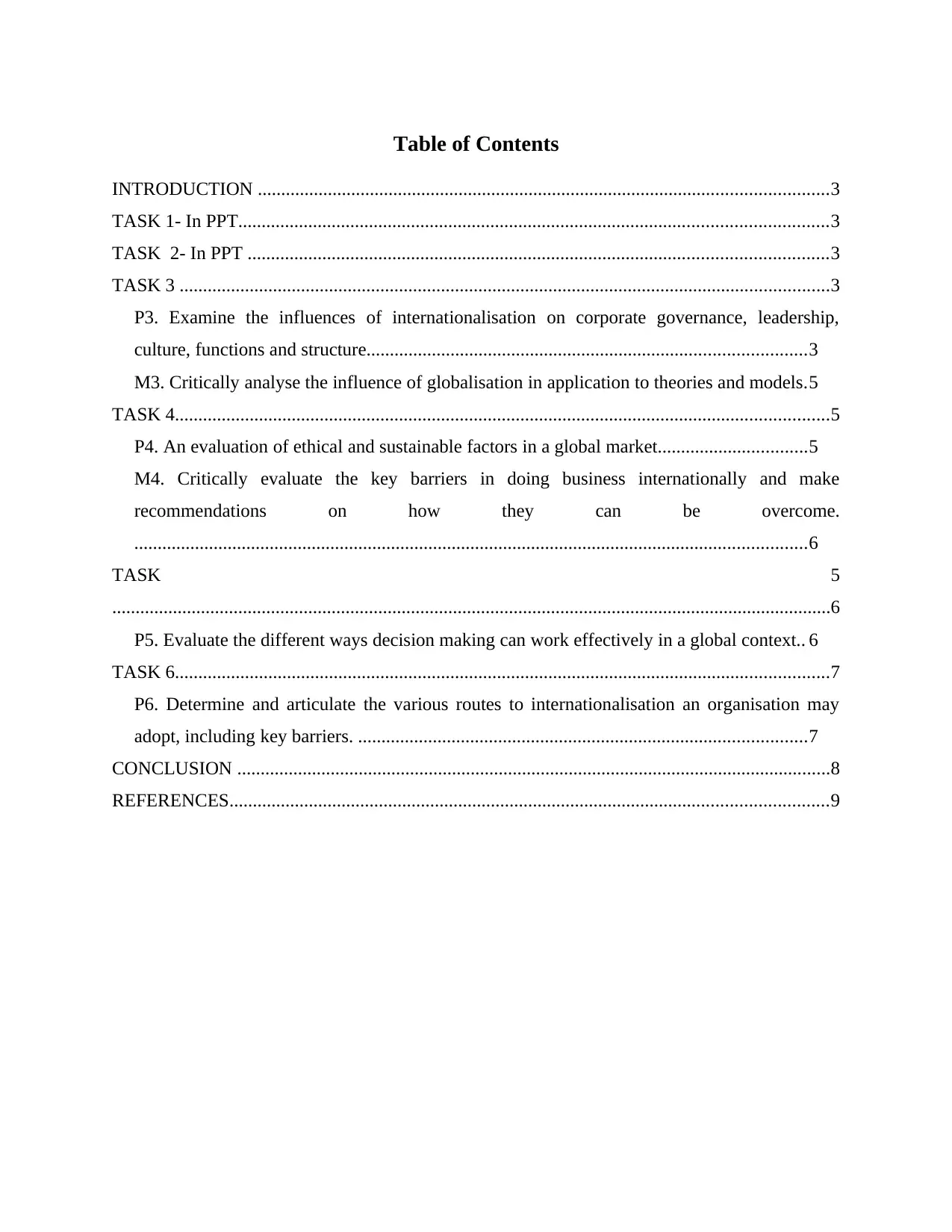
Table of Contents
INTRODUCTION ..........................................................................................................................3
TASK 1- In PPT..............................................................................................................................3
TASK 2- In PPT ............................................................................................................................3
TASK 3 ...........................................................................................................................................3
P3. Examine the influences of internationalisation on corporate governance, leadership,
culture, functions and structure..............................................................................................3
M3. Critically analyse the influence of globalisation in application to theories and models.5
TASK 4............................................................................................................................................5
P4. An evaluation of ethical and sustainable factors in a global market................................5
M4. Critically evaluate the key barriers in doing business internationally and make
recommendations on how they can be overcome.
................................................................................................................................................6
TASK 5
..........................................................................................................................................................6
P5. Evaluate the different ways decision making can work effectively in a global context.. 6
TASK 6............................................................................................................................................7
P6. Determine and articulate the various routes to internationalisation an organisation may
adopt, including key barriers. ................................................................................................7
CONCLUSION ...............................................................................................................................8
REFERENCES................................................................................................................................9
INTRODUCTION ..........................................................................................................................3
TASK 1- In PPT..............................................................................................................................3
TASK 2- In PPT ............................................................................................................................3
TASK 3 ...........................................................................................................................................3
P3. Examine the influences of internationalisation on corporate governance, leadership,
culture, functions and structure..............................................................................................3
M3. Critically analyse the influence of globalisation in application to theories and models.5
TASK 4............................................................................................................................................5
P4. An evaluation of ethical and sustainable factors in a global market................................5
M4. Critically evaluate the key barriers in doing business internationally and make
recommendations on how they can be overcome.
................................................................................................................................................6
TASK 5
..........................................................................................................................................................6
P5. Evaluate the different ways decision making can work effectively in a global context.. 6
TASK 6............................................................................................................................................7
P6. Determine and articulate the various routes to internationalisation an organisation may
adopt, including key barriers. ................................................................................................7
CONCLUSION ...............................................................................................................................8
REFERENCES................................................................................................................................9
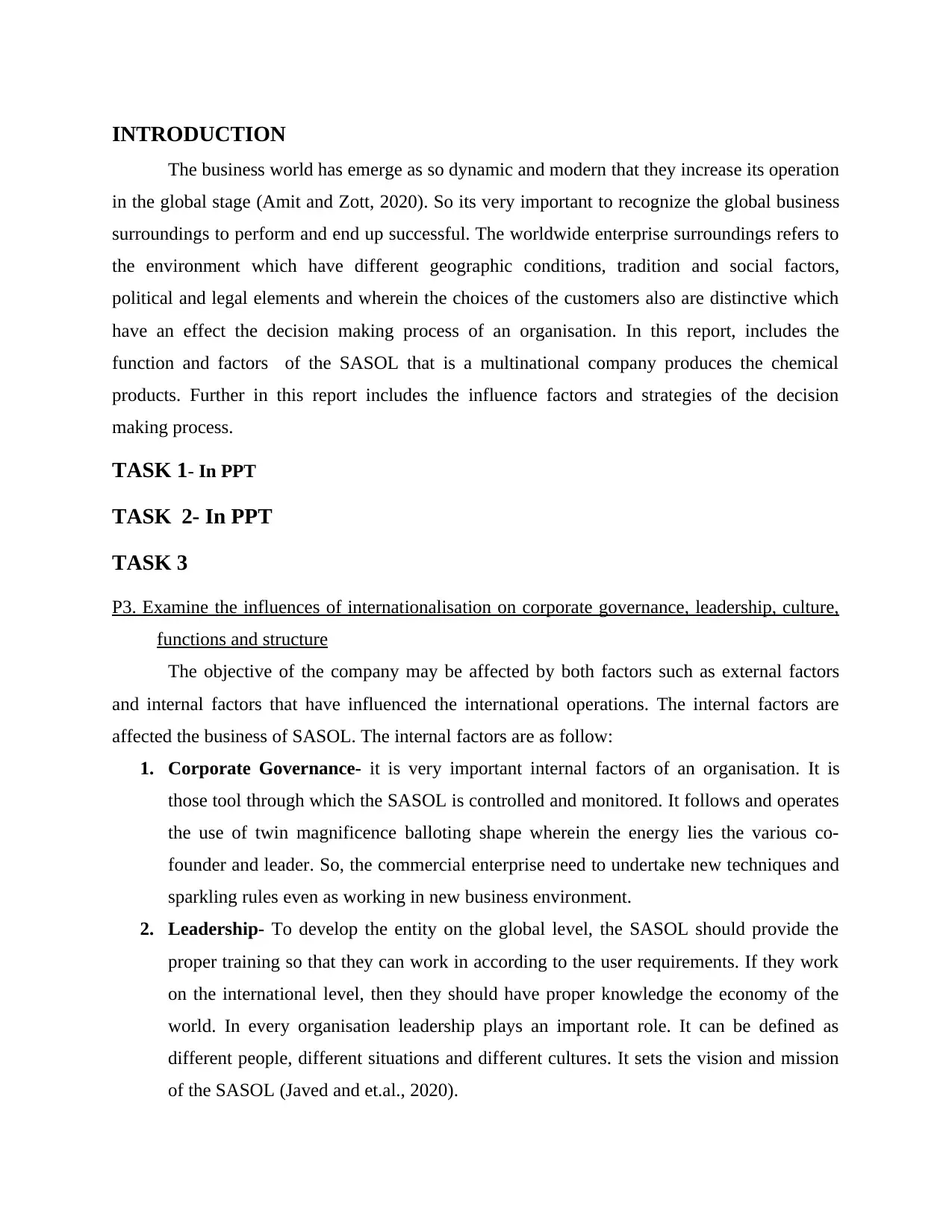
INTRODUCTION
The business world has emerge as so dynamic and modern that they increase its operation
in the global stage (Amit and Zott, 2020). So its very important to recognize the global business
surroundings to perform and end up successful. The worldwide enterprise surroundings refers to
the environment which have different geographic conditions, tradition and social factors,
political and legal elements and wherein the choices of the customers also are distinctive which
have an effect the decision making process of an organisation. In this report, includes the
function and factors of the SASOL that is a multinational company produces the chemical
products. Further in this report includes the influence factors and strategies of the decision
making process.
TASK 1- In PPT
TASK 2- In PPT
TASK 3
P3. Examine the influences of internationalisation on corporate governance, leadership, culture,
functions and structure
The objective of the company may be affected by both factors such as external factors
and internal factors that have influenced the international operations. The internal factors are
affected the business of SASOL. The internal factors are as follow:
1. Corporate Governance- it is very important internal factors of an organisation. It is
those tool through which the SASOL is controlled and monitored. It follows and operates
the use of twin magnificence balloting shape wherein the energy lies the various co-
founder and leader. So, the commercial enterprise need to undertake new techniques and
sparkling rules even as working in new business environment.
2. Leadership- To develop the entity on the global level, the SASOL should provide the
proper training so that they can work in according to the user requirements. If they work
on the international level, then they should have proper knowledge the economy of the
world. In every organisation leadership plays an important role. It can be defined as
different people, different situations and different cultures. It sets the vision and mission
of the SASOL (Javed and et.al., 2020).
The business world has emerge as so dynamic and modern that they increase its operation
in the global stage (Amit and Zott, 2020). So its very important to recognize the global business
surroundings to perform and end up successful. The worldwide enterprise surroundings refers to
the environment which have different geographic conditions, tradition and social factors,
political and legal elements and wherein the choices of the customers also are distinctive which
have an effect the decision making process of an organisation. In this report, includes the
function and factors of the SASOL that is a multinational company produces the chemical
products. Further in this report includes the influence factors and strategies of the decision
making process.
TASK 1- In PPT
TASK 2- In PPT
TASK 3
P3. Examine the influences of internationalisation on corporate governance, leadership, culture,
functions and structure
The objective of the company may be affected by both factors such as external factors
and internal factors that have influenced the international operations. The internal factors are
affected the business of SASOL. The internal factors are as follow:
1. Corporate Governance- it is very important internal factors of an organisation. It is
those tool through which the SASOL is controlled and monitored. It follows and operates
the use of twin magnificence balloting shape wherein the energy lies the various co-
founder and leader. So, the commercial enterprise need to undertake new techniques and
sparkling rules even as working in new business environment.
2. Leadership- To develop the entity on the global level, the SASOL should provide the
proper training so that they can work in according to the user requirements. If they work
on the international level, then they should have proper knowledge the economy of the
world. In every organisation leadership plays an important role. It can be defined as
different people, different situations and different cultures. It sets the vision and mission
of the SASOL (Javed and et.al., 2020).
⊘ This is a preview!⊘
Do you want full access?
Subscribe today to unlock all pages.

Trusted by 1+ million students worldwide
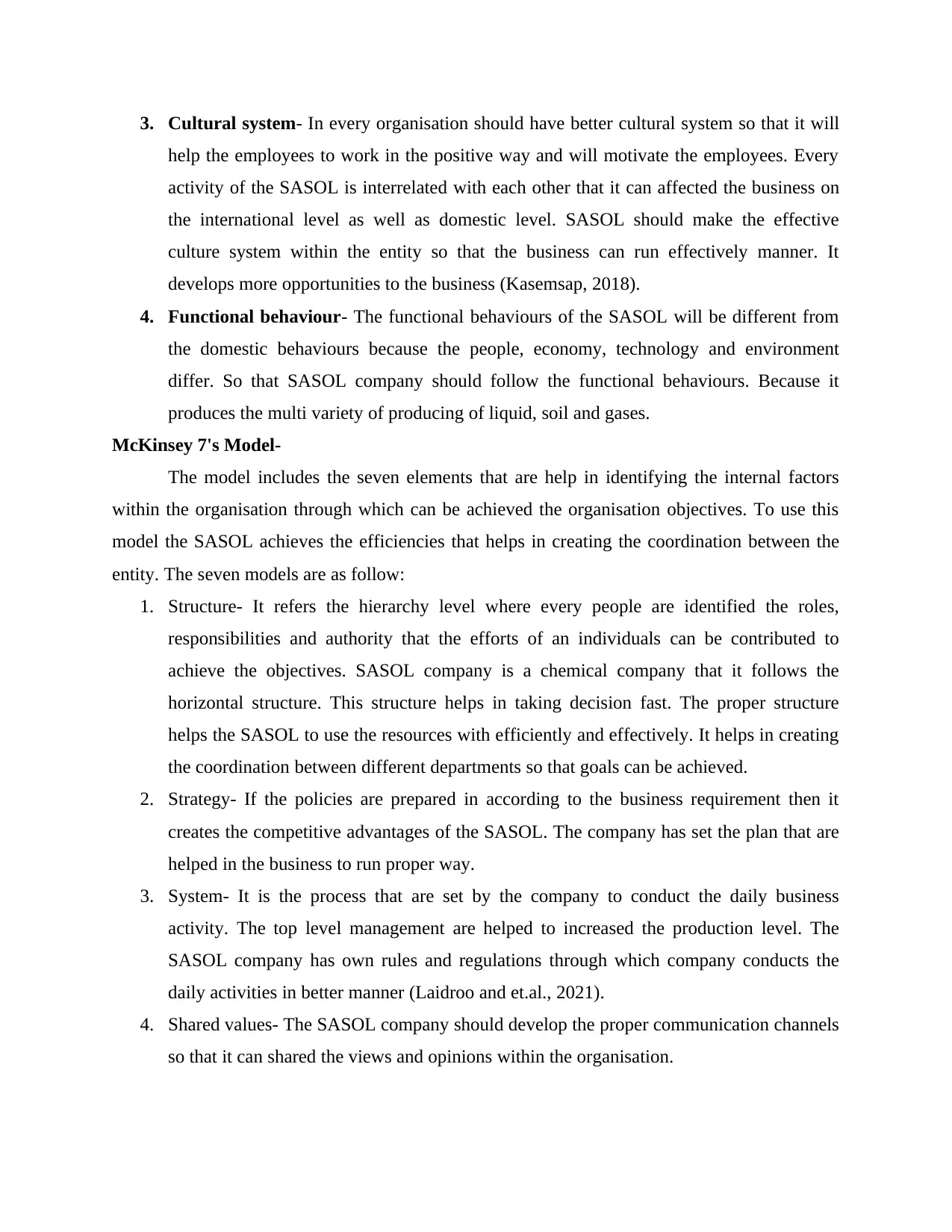
3. Cultural system- In every organisation should have better cultural system so that it will
help the employees to work in the positive way and will motivate the employees. Every
activity of the SASOL is interrelated with each other that it can affected the business on
the international level as well as domestic level. SASOL should make the effective
culture system within the entity so that the business can run effectively manner. It
develops more opportunities to the business (Kasemsap, 2018).
4. Functional behaviour- The functional behaviours of the SASOL will be different from
the domestic behaviours because the people, economy, technology and environment
differ. So that SASOL company should follow the functional behaviours. Because it
produces the multi variety of producing of liquid, soil and gases.
McKinsey 7's Model-
The model includes the seven elements that are help in identifying the internal factors
within the organisation through which can be achieved the organisation objectives. To use this
model the SASOL achieves the efficiencies that helps in creating the coordination between the
entity. The seven models are as follow:
1. Structure- It refers the hierarchy level where every people are identified the roles,
responsibilities and authority that the efforts of an individuals can be contributed to
achieve the objectives. SASOL company is a chemical company that it follows the
horizontal structure. This structure helps in taking decision fast. The proper structure
helps the SASOL to use the resources with efficiently and effectively. It helps in creating
the coordination between different departments so that goals can be achieved.
2. Strategy- If the policies are prepared in according to the business requirement then it
creates the competitive advantages of the SASOL. The company has set the plan that are
helped in the business to run proper way.
3. System- It is the process that are set by the company to conduct the daily business
activity. The top level management are helped to increased the production level. The
SASOL company has own rules and regulations through which company conducts the
daily activities in better manner (Laidroo and et.al., 2021).
4. Shared values- The SASOL company should develop the proper communication channels
so that it can shared the views and opinions within the organisation.
help the employees to work in the positive way and will motivate the employees. Every
activity of the SASOL is interrelated with each other that it can affected the business on
the international level as well as domestic level. SASOL should make the effective
culture system within the entity so that the business can run effectively manner. It
develops more opportunities to the business (Kasemsap, 2018).
4. Functional behaviour- The functional behaviours of the SASOL will be different from
the domestic behaviours because the people, economy, technology and environment
differ. So that SASOL company should follow the functional behaviours. Because it
produces the multi variety of producing of liquid, soil and gases.
McKinsey 7's Model-
The model includes the seven elements that are help in identifying the internal factors
within the organisation through which can be achieved the organisation objectives. To use this
model the SASOL achieves the efficiencies that helps in creating the coordination between the
entity. The seven models are as follow:
1. Structure- It refers the hierarchy level where every people are identified the roles,
responsibilities and authority that the efforts of an individuals can be contributed to
achieve the objectives. SASOL company is a chemical company that it follows the
horizontal structure. This structure helps in taking decision fast. The proper structure
helps the SASOL to use the resources with efficiently and effectively. It helps in creating
the coordination between different departments so that goals can be achieved.
2. Strategy- If the policies are prepared in according to the business requirement then it
creates the competitive advantages of the SASOL. The company has set the plan that are
helped in the business to run proper way.
3. System- It is the process that are set by the company to conduct the daily business
activity. The top level management are helped to increased the production level. The
SASOL company has own rules and regulations through which company conducts the
daily activities in better manner (Laidroo and et.al., 2021).
4. Shared values- The SASOL company should develop the proper communication channels
so that it can shared the views and opinions within the organisation.
Paraphrase This Document
Need a fresh take? Get an instant paraphrase of this document with our AI Paraphraser
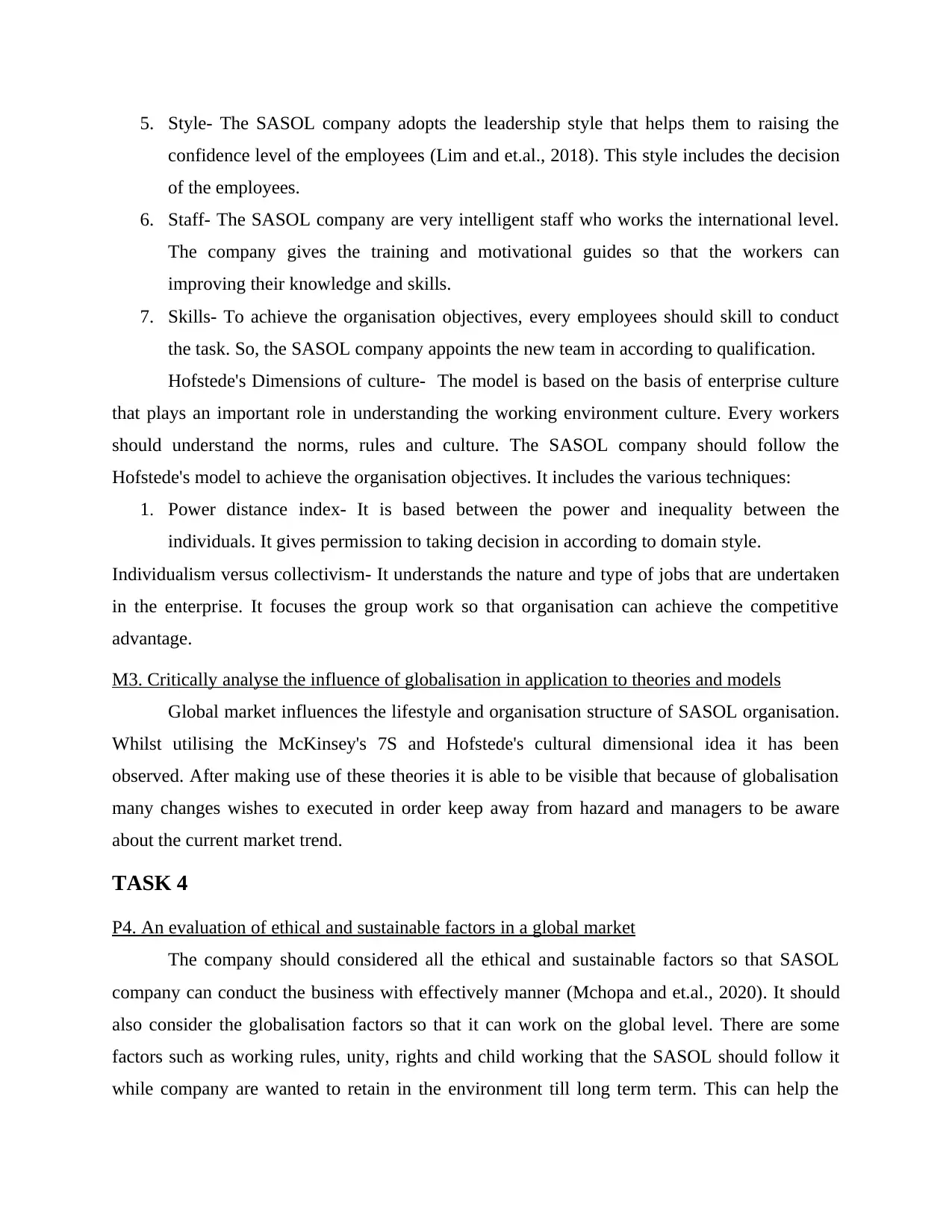
5. Style- The SASOL company adopts the leadership style that helps them to raising the
confidence level of the employees (Lim and et.al., 2018). This style includes the decision
of the employees.
6. Staff- The SASOL company are very intelligent staff who works the international level.
The company gives the training and motivational guides so that the workers can
improving their knowledge and skills.
7. Skills- To achieve the organisation objectives, every employees should skill to conduct
the task. So, the SASOL company appoints the new team in according to qualification.
Hofstede's Dimensions of culture- The model is based on the basis of enterprise culture
that plays an important role in understanding the working environment culture. Every workers
should understand the norms, rules and culture. The SASOL company should follow the
Hofstede's model to achieve the organisation objectives. It includes the various techniques:
1. Power distance index- It is based between the power and inequality between the
individuals. It gives permission to taking decision in according to domain style.
Individualism versus collectivism- It understands the nature and type of jobs that are undertaken
in the enterprise. It focuses the group work so that organisation can achieve the competitive
advantage.
M3. Critically analyse the influence of globalisation in application to theories and models
Global market influences the lifestyle and organisation structure of SASOL organisation.
Whilst utilising the McKinsey's 7S and Hofstede's cultural dimensional idea it has been
observed. After making use of these theories it is able to be visible that because of globalisation
many changes wishes to executed in order keep away from hazard and managers to be aware
about the current market trend.
TASK 4
P4. An evaluation of ethical and sustainable factors in a global market
The company should considered all the ethical and sustainable factors so that SASOL
company can conduct the business with effectively manner (Mchopa and et.al., 2020). It should
also consider the globalisation factors so that it can work on the global level. There are some
factors such as working rules, unity, rights and child working that the SASOL should follow it
while company are wanted to retain in the environment till long term term. This can help the
confidence level of the employees (Lim and et.al., 2018). This style includes the decision
of the employees.
6. Staff- The SASOL company are very intelligent staff who works the international level.
The company gives the training and motivational guides so that the workers can
improving their knowledge and skills.
7. Skills- To achieve the organisation objectives, every employees should skill to conduct
the task. So, the SASOL company appoints the new team in according to qualification.
Hofstede's Dimensions of culture- The model is based on the basis of enterprise culture
that plays an important role in understanding the working environment culture. Every workers
should understand the norms, rules and culture. The SASOL company should follow the
Hofstede's model to achieve the organisation objectives. It includes the various techniques:
1. Power distance index- It is based between the power and inequality between the
individuals. It gives permission to taking decision in according to domain style.
Individualism versus collectivism- It understands the nature and type of jobs that are undertaken
in the enterprise. It focuses the group work so that organisation can achieve the competitive
advantage.
M3. Critically analyse the influence of globalisation in application to theories and models
Global market influences the lifestyle and organisation structure of SASOL organisation.
Whilst utilising the McKinsey's 7S and Hofstede's cultural dimensional idea it has been
observed. After making use of these theories it is able to be visible that because of globalisation
many changes wishes to executed in order keep away from hazard and managers to be aware
about the current market trend.
TASK 4
P4. An evaluation of ethical and sustainable factors in a global market
The company should considered all the ethical and sustainable factors so that SASOL
company can conduct the business with effectively manner (Mchopa and et.al., 2020). It should
also consider the globalisation factors so that it can work on the global level. There are some
factors such as working rules, unity, rights and child working that the SASOL should follow it
while company are wanted to retain in the environment till long term term. This can help the
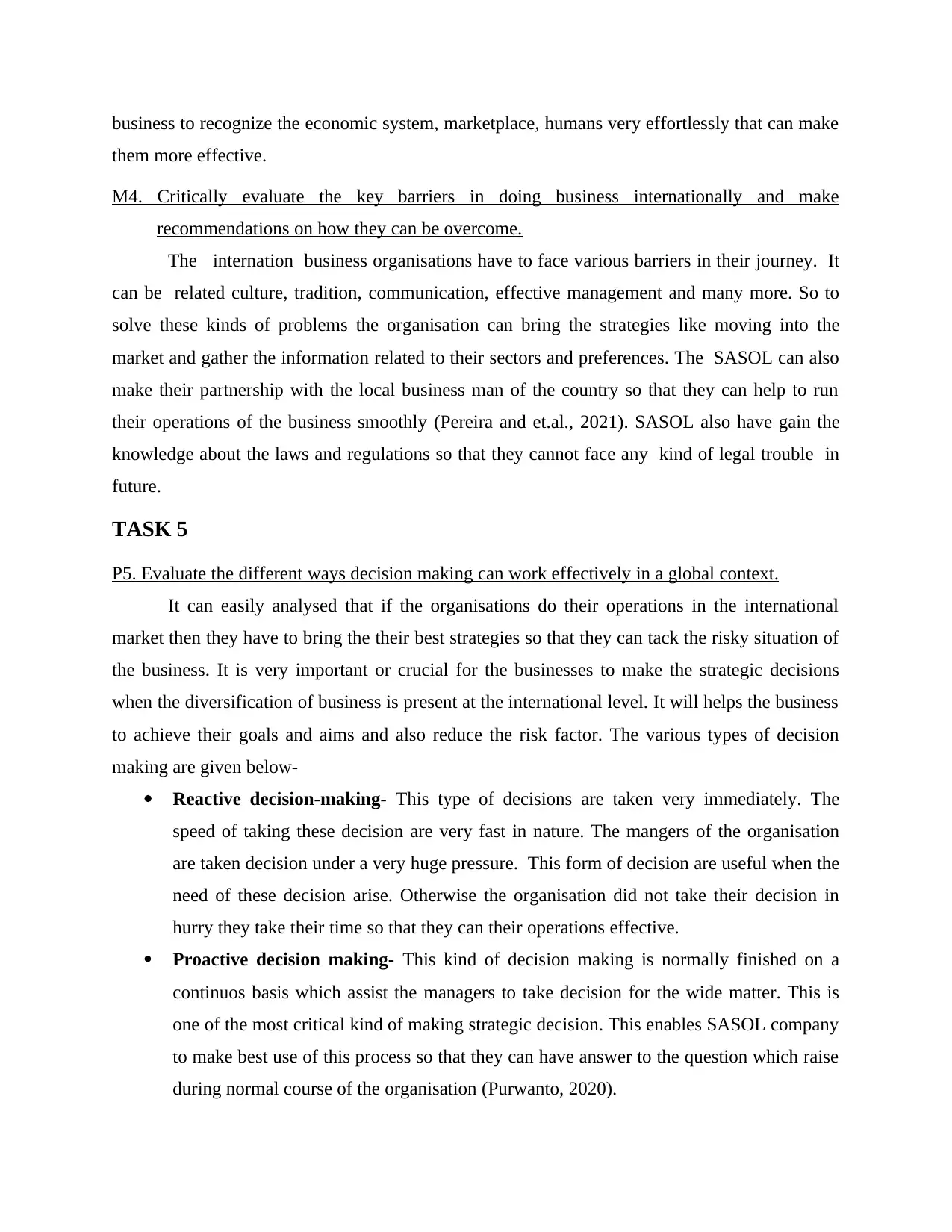
business to recognize the economic system, marketplace, humans very effortlessly that can make
them more effective.
M4. Critically evaluate the key barriers in doing business internationally and make
recommendations on how they can be overcome.
The internation business organisations have to face various barriers in their journey. It
can be related culture, tradition, communication, effective management and many more. So to
solve these kinds of problems the organisation can bring the strategies like moving into the
market and gather the information related to their sectors and preferences. The SASOL can also
make their partnership with the local business man of the country so that they can help to run
their operations of the business smoothly (Pereira and et.al., 2021). SASOL also have gain the
knowledge about the laws and regulations so that they cannot face any kind of legal trouble in
future.
TASK 5
P5. Evaluate the different ways decision making can work effectively in a global context.
It can easily analysed that if the organisations do their operations in the international
market then they have to bring the their best strategies so that they can tack the risky situation of
the business. It is very important or crucial for the businesses to make the strategic decisions
when the diversification of business is present at the international level. It will helps the business
to achieve their goals and aims and also reduce the risk factor. The various types of decision
making are given below-
Reactive decision-making- This type of decisions are taken very immediately. The
speed of taking these decision are very fast in nature. The mangers of the organisation
are taken decision under a very huge pressure. This form of decision are useful when the
need of these decision arise. Otherwise the organisation did not take their decision in
hurry they take their time so that they can their operations effective.
Proactive decision making- This kind of decision making is normally finished on a
continuos basis which assist the managers to take decision for the wide matter. This is
one of the most critical kind of making strategic decision. This enables SASOL company
to make best use of this process so that they can have answer to the question which raise
during normal course of the organisation (Purwanto, 2020).
them more effective.
M4. Critically evaluate the key barriers in doing business internationally and make
recommendations on how they can be overcome.
The internation business organisations have to face various barriers in their journey. It
can be related culture, tradition, communication, effective management and many more. So to
solve these kinds of problems the organisation can bring the strategies like moving into the
market and gather the information related to their sectors and preferences. The SASOL can also
make their partnership with the local business man of the country so that they can help to run
their operations of the business smoothly (Pereira and et.al., 2021). SASOL also have gain the
knowledge about the laws and regulations so that they cannot face any kind of legal trouble in
future.
TASK 5
P5. Evaluate the different ways decision making can work effectively in a global context.
It can easily analysed that if the organisations do their operations in the international
market then they have to bring the their best strategies so that they can tack the risky situation of
the business. It is very important or crucial for the businesses to make the strategic decisions
when the diversification of business is present at the international level. It will helps the business
to achieve their goals and aims and also reduce the risk factor. The various types of decision
making are given below-
Reactive decision-making- This type of decisions are taken very immediately. The
speed of taking these decision are very fast in nature. The mangers of the organisation
are taken decision under a very huge pressure. This form of decision are useful when the
need of these decision arise. Otherwise the organisation did not take their decision in
hurry they take their time so that they can their operations effective.
Proactive decision making- This kind of decision making is normally finished on a
continuos basis which assist the managers to take decision for the wide matter. This is
one of the most critical kind of making strategic decision. This enables SASOL company
to make best use of this process so that they can have answer to the question which raise
during normal course of the organisation (Purwanto, 2020).
⊘ This is a preview!⊘
Do you want full access?
Subscribe today to unlock all pages.

Trusted by 1+ million students worldwide
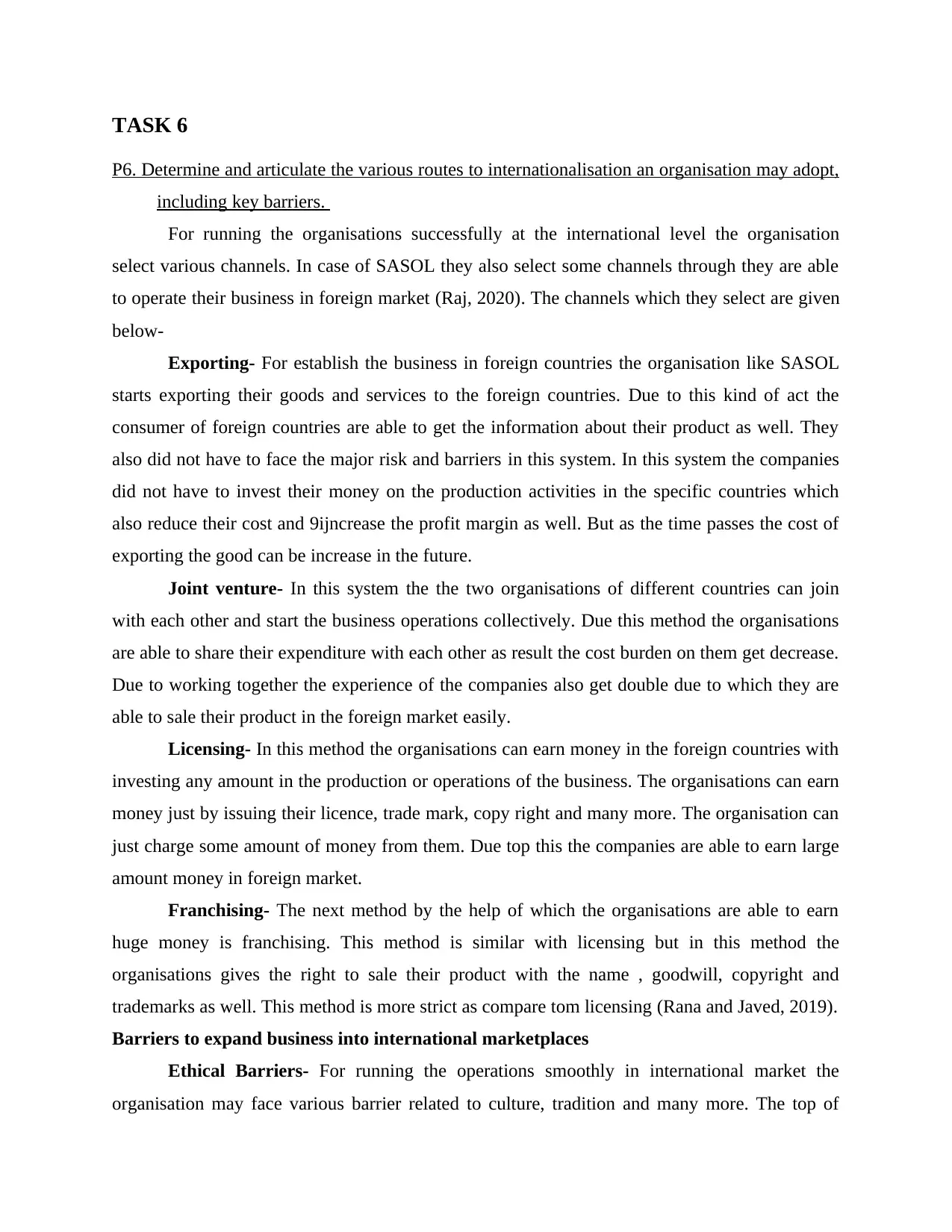
TASK 6
P6. Determine and articulate the various routes to internationalisation an organisation may adopt,
including key barriers.
For running the organisations successfully at the international level the organisation
select various channels. In case of SASOL they also select some channels through they are able
to operate their business in foreign market (Raj, 2020). The channels which they select are given
below-
Exporting- For establish the business in foreign countries the organisation like SASOL
starts exporting their goods and services to the foreign countries. Due to this kind of act the
consumer of foreign countries are able to get the information about their product as well. They
also did not have to face the major risk and barriers in this system. In this system the companies
did not have to invest their money on the production activities in the specific countries which
also reduce their cost and 9ijncrease the profit margin as well. But as the time passes the cost of
exporting the good can be increase in the future.
Joint venture- In this system the the two organisations of different countries can join
with each other and start the business operations collectively. Due this method the organisations
are able to share their expenditure with each other as result the cost burden on them get decrease.
Due to working together the experience of the companies also get double due to which they are
able to sale their product in the foreign market easily.
Licensing- In this method the organisations can earn money in the foreign countries with
investing any amount in the production or operations of the business. The organisations can earn
money just by issuing their licence, trade mark, copy right and many more. The organisation can
just charge some amount of money from them. Due top this the companies are able to earn large
amount money in foreign market.
Franchising- The next method by the help of which the organisations are able to earn
huge money is franchising. This method is similar with licensing but in this method the
organisations gives the right to sale their product with the name , goodwill, copyright and
trademarks as well. This method is more strict as compare tom licensing (Rana and Javed, 2019).
Barriers to expand business into international marketplaces
Ethical Barriers- For running the operations smoothly in international market the
organisation may face various barrier related to culture, tradition and many more. The top of
P6. Determine and articulate the various routes to internationalisation an organisation may adopt,
including key barriers.
For running the organisations successfully at the international level the organisation
select various channels. In case of SASOL they also select some channels through they are able
to operate their business in foreign market (Raj, 2020). The channels which they select are given
below-
Exporting- For establish the business in foreign countries the organisation like SASOL
starts exporting their goods and services to the foreign countries. Due to this kind of act the
consumer of foreign countries are able to get the information about their product as well. They
also did not have to face the major risk and barriers in this system. In this system the companies
did not have to invest their money on the production activities in the specific countries which
also reduce their cost and 9ijncrease the profit margin as well. But as the time passes the cost of
exporting the good can be increase in the future.
Joint venture- In this system the the two organisations of different countries can join
with each other and start the business operations collectively. Due this method the organisations
are able to share their expenditure with each other as result the cost burden on them get decrease.
Due to working together the experience of the companies also get double due to which they are
able to sale their product in the foreign market easily.
Licensing- In this method the organisations can earn money in the foreign countries with
investing any amount in the production or operations of the business. The organisations can earn
money just by issuing their licence, trade mark, copy right and many more. The organisation can
just charge some amount of money from them. Due top this the companies are able to earn large
amount money in foreign market.
Franchising- The next method by the help of which the organisations are able to earn
huge money is franchising. This method is similar with licensing but in this method the
organisations gives the right to sale their product with the name , goodwill, copyright and
trademarks as well. This method is more strict as compare tom licensing (Rana and Javed, 2019).
Barriers to expand business into international marketplaces
Ethical Barriers- For running the operations smoothly in international market the
organisation may face various barrier related to culture, tradition and many more. The top of
Paraphrase This Document
Need a fresh take? Get an instant paraphrase of this document with our AI Paraphraser
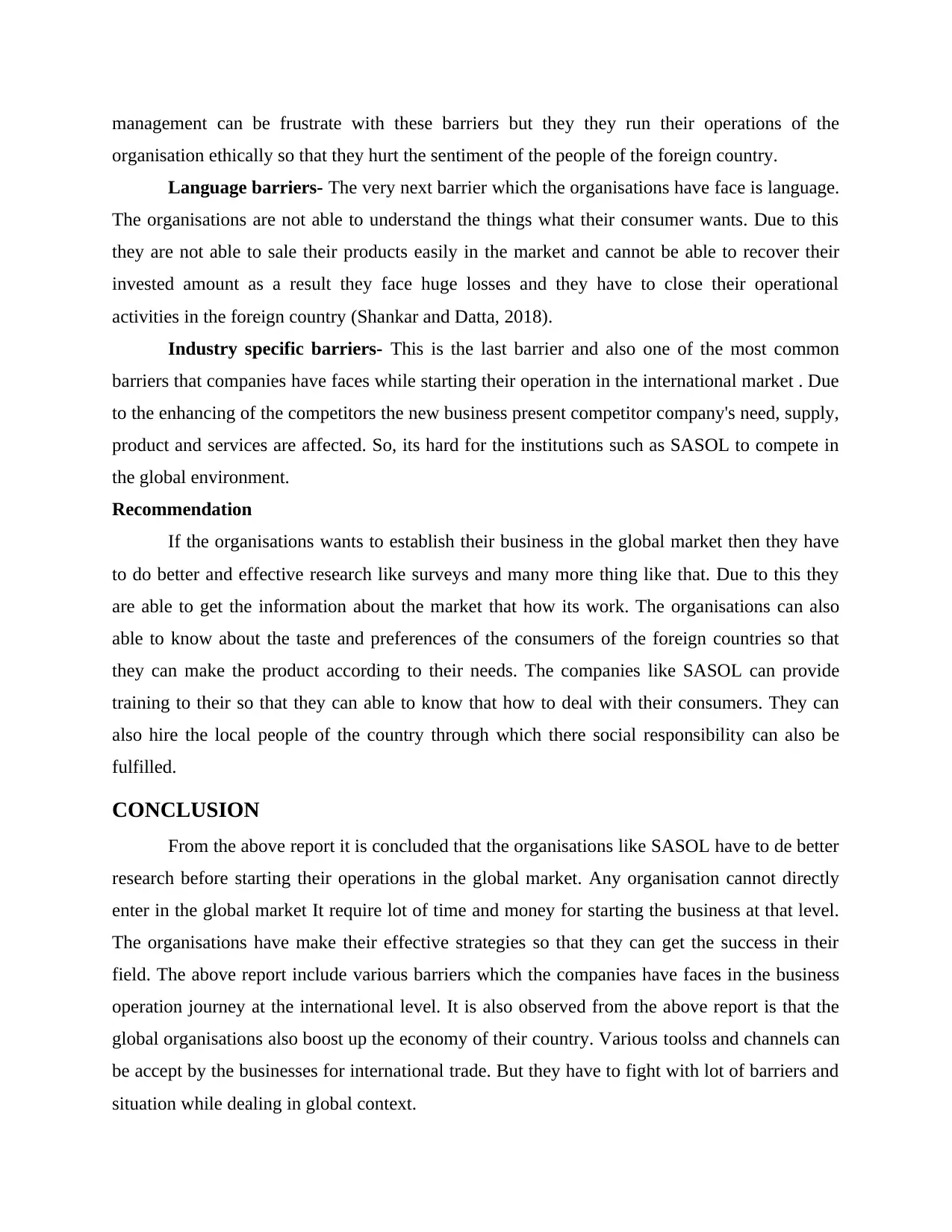
management can be frustrate with these barriers but they they run their operations of the
organisation ethically so that they hurt the sentiment of the people of the foreign country.
Language barriers- The very next barrier which the organisations have face is language.
The organisations are not able to understand the things what their consumer wants. Due to this
they are not able to sale their products easily in the market and cannot be able to recover their
invested amount as a result they face huge losses and they have to close their operational
activities in the foreign country (Shankar and Datta, 2018).
Industry specific barriers- This is the last barrier and also one of the most common
barriers that companies have faces while starting their operation in the international market . Due
to the enhancing of the competitors the new business present competitor company's need, supply,
product and services are affected. So, its hard for the institutions such as SASOL to compete in
the global environment.
Recommendation
If the organisations wants to establish their business in the global market then they have
to do better and effective research like surveys and many more thing like that. Due to this they
are able to get the information about the market that how its work. The organisations can also
able to know about the taste and preferences of the consumers of the foreign countries so that
they can make the product according to their needs. The companies like SASOL can provide
training to their so that they can able to know that how to deal with their consumers. They can
also hire the local people of the country through which there social responsibility can also be
fulfilled.
CONCLUSION
From the above report it is concluded that the organisations like SASOL have to de better
research before starting their operations in the global market. Any organisation cannot directly
enter in the global market It require lot of time and money for starting the business at that level.
The organisations have make their effective strategies so that they can get the success in their
field. The above report include various barriers which the companies have faces in the business
operation journey at the international level. It is also observed from the above report is that the
global organisations also boost up the economy of their country. Various toolss and channels can
be accept by the businesses for international trade. But they have to fight with lot of barriers and
situation while dealing in global context.
organisation ethically so that they hurt the sentiment of the people of the foreign country.
Language barriers- The very next barrier which the organisations have face is language.
The organisations are not able to understand the things what their consumer wants. Due to this
they are not able to sale their products easily in the market and cannot be able to recover their
invested amount as a result they face huge losses and they have to close their operational
activities in the foreign country (Shankar and Datta, 2018).
Industry specific barriers- This is the last barrier and also one of the most common
barriers that companies have faces while starting their operation in the international market . Due
to the enhancing of the competitors the new business present competitor company's need, supply,
product and services are affected. So, its hard for the institutions such as SASOL to compete in
the global environment.
Recommendation
If the organisations wants to establish their business in the global market then they have
to do better and effective research like surveys and many more thing like that. Due to this they
are able to get the information about the market that how its work. The organisations can also
able to know about the taste and preferences of the consumers of the foreign countries so that
they can make the product according to their needs. The companies like SASOL can provide
training to their so that they can able to know that how to deal with their consumers. They can
also hire the local people of the country through which there social responsibility can also be
fulfilled.
CONCLUSION
From the above report it is concluded that the organisations like SASOL have to de better
research before starting their operations in the global market. Any organisation cannot directly
enter in the global market It require lot of time and money for starting the business at that level.
The organisations have make their effective strategies so that they can get the success in their
field. The above report include various barriers which the companies have faces in the business
operation journey at the international level. It is also observed from the above report is that the
global organisations also boost up the economy of their country. Various toolss and channels can
be accept by the businesses for international trade. But they have to fight with lot of barriers and
situation while dealing in global context.
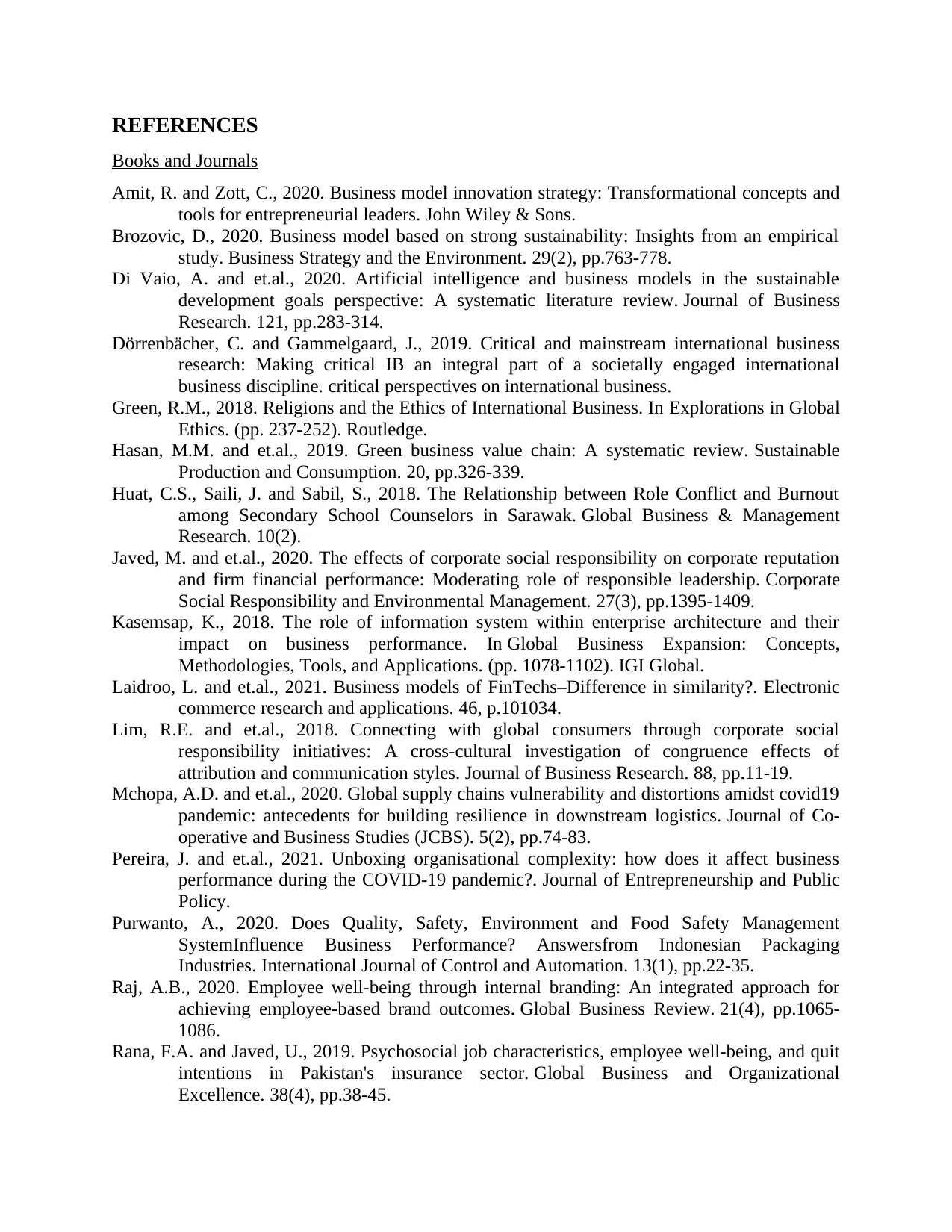
REFERENCES
Books and Journals
Amit, R. and Zott, C., 2020. Business model innovation strategy: Transformational concepts and
tools for entrepreneurial leaders. John Wiley & Sons.
Brozovic, D., 2020. Business model based on strong sustainability: Insights from an empirical
study. Business Strategy and the Environment. 29(2), pp.763-778.
Di Vaio, A. and et.al., 2020. Artificial intelligence and business models in the sustainable
development goals perspective: A systematic literature review. Journal of Business
Research. 121, pp.283-314.
Dörrenbächer, C. and Gammelgaard, J., 2019. Critical and mainstream international business
research: Making critical IB an integral part of a societally engaged international
business discipline. critical perspectives on international business.
Green, R.M., 2018. Religions and the Ethics of International Business. In Explorations in Global
Ethics. (pp. 237-252). Routledge.
Hasan, M.M. and et.al., 2019. Green business value chain: A systematic review. Sustainable
Production and Consumption. 20, pp.326-339.
Huat, C.S., Saili, J. and Sabil, S., 2018. The Relationship between Role Conflict and Burnout
among Secondary School Counselors in Sarawak. Global Business & Management
Research. 10(2).
Javed, M. and et.al., 2020. The effects of corporate social responsibility on corporate reputation
and firm financial performance: Moderating role of responsible leadership. Corporate
Social Responsibility and Environmental Management. 27(3), pp.1395-1409.
Kasemsap, K., 2018. The role of information system within enterprise architecture and their
impact on business performance. In Global Business Expansion: Concepts,
Methodologies, Tools, and Applications. (pp. 1078-1102). IGI Global.
Laidroo, L. and et.al., 2021. Business models of FinTechs–Difference in similarity?. Electronic
commerce research and applications. 46, p.101034.
Lim, R.E. and et.al., 2018. Connecting with global consumers through corporate social
responsibility initiatives: A cross-cultural investigation of congruence effects of
attribution and communication styles. Journal of Business Research. 88, pp.11-19.
Mchopa, A.D. and et.al., 2020. Global supply chains vulnerability and distortions amidst covid19
pandemic: antecedents for building resilience in downstream logistics. Journal of Co-
operative and Business Studies (JCBS). 5(2), pp.74-83.
Pereira, J. and et.al., 2021. Unboxing organisational complexity: how does it affect business
performance during the COVID-19 pandemic?. Journal of Entrepreneurship and Public
Policy.
Purwanto, A., 2020. Does Quality, Safety, Environment and Food Safety Management
SystemInfluence Business Performance? Answersfrom Indonesian Packaging
Industries. International Journal of Control and Automation. 13(1), pp.22-35.
Raj, A.B., 2020. Employee well-being through internal branding: An integrated approach for
achieving employee-based brand outcomes. Global Business Review. 21(4), pp.1065-
1086.
Rana, F.A. and Javed, U., 2019. Psychosocial job characteristics, employee well‐being, and quit
intentions in Pakistan's insurance sector. Global Business and Organizational
Excellence. 38(4), pp.38-45.
Books and Journals
Amit, R. and Zott, C., 2020. Business model innovation strategy: Transformational concepts and
tools for entrepreneurial leaders. John Wiley & Sons.
Brozovic, D., 2020. Business model based on strong sustainability: Insights from an empirical
study. Business Strategy and the Environment. 29(2), pp.763-778.
Di Vaio, A. and et.al., 2020. Artificial intelligence and business models in the sustainable
development goals perspective: A systematic literature review. Journal of Business
Research. 121, pp.283-314.
Dörrenbächer, C. and Gammelgaard, J., 2019. Critical and mainstream international business
research: Making critical IB an integral part of a societally engaged international
business discipline. critical perspectives on international business.
Green, R.M., 2018. Religions and the Ethics of International Business. In Explorations in Global
Ethics. (pp. 237-252). Routledge.
Hasan, M.M. and et.al., 2019. Green business value chain: A systematic review. Sustainable
Production and Consumption. 20, pp.326-339.
Huat, C.S., Saili, J. and Sabil, S., 2018. The Relationship between Role Conflict and Burnout
among Secondary School Counselors in Sarawak. Global Business & Management
Research. 10(2).
Javed, M. and et.al., 2020. The effects of corporate social responsibility on corporate reputation
and firm financial performance: Moderating role of responsible leadership. Corporate
Social Responsibility and Environmental Management. 27(3), pp.1395-1409.
Kasemsap, K., 2018. The role of information system within enterprise architecture and their
impact on business performance. In Global Business Expansion: Concepts,
Methodologies, Tools, and Applications. (pp. 1078-1102). IGI Global.
Laidroo, L. and et.al., 2021. Business models of FinTechs–Difference in similarity?. Electronic
commerce research and applications. 46, p.101034.
Lim, R.E. and et.al., 2018. Connecting with global consumers through corporate social
responsibility initiatives: A cross-cultural investigation of congruence effects of
attribution and communication styles. Journal of Business Research. 88, pp.11-19.
Mchopa, A.D. and et.al., 2020. Global supply chains vulnerability and distortions amidst covid19
pandemic: antecedents for building resilience in downstream logistics. Journal of Co-
operative and Business Studies (JCBS). 5(2), pp.74-83.
Pereira, J. and et.al., 2021. Unboxing organisational complexity: how does it affect business
performance during the COVID-19 pandemic?. Journal of Entrepreneurship and Public
Policy.
Purwanto, A., 2020. Does Quality, Safety, Environment and Food Safety Management
SystemInfluence Business Performance? Answersfrom Indonesian Packaging
Industries. International Journal of Control and Automation. 13(1), pp.22-35.
Raj, A.B., 2020. Employee well-being through internal branding: An integrated approach for
achieving employee-based brand outcomes. Global Business Review. 21(4), pp.1065-
1086.
Rana, F.A. and Javed, U., 2019. Psychosocial job characteristics, employee well‐being, and quit
intentions in Pakistan's insurance sector. Global Business and Organizational
Excellence. 38(4), pp.38-45.
⊘ This is a preview!⊘
Do you want full access?
Subscribe today to unlock all pages.

Trusted by 1+ million students worldwide
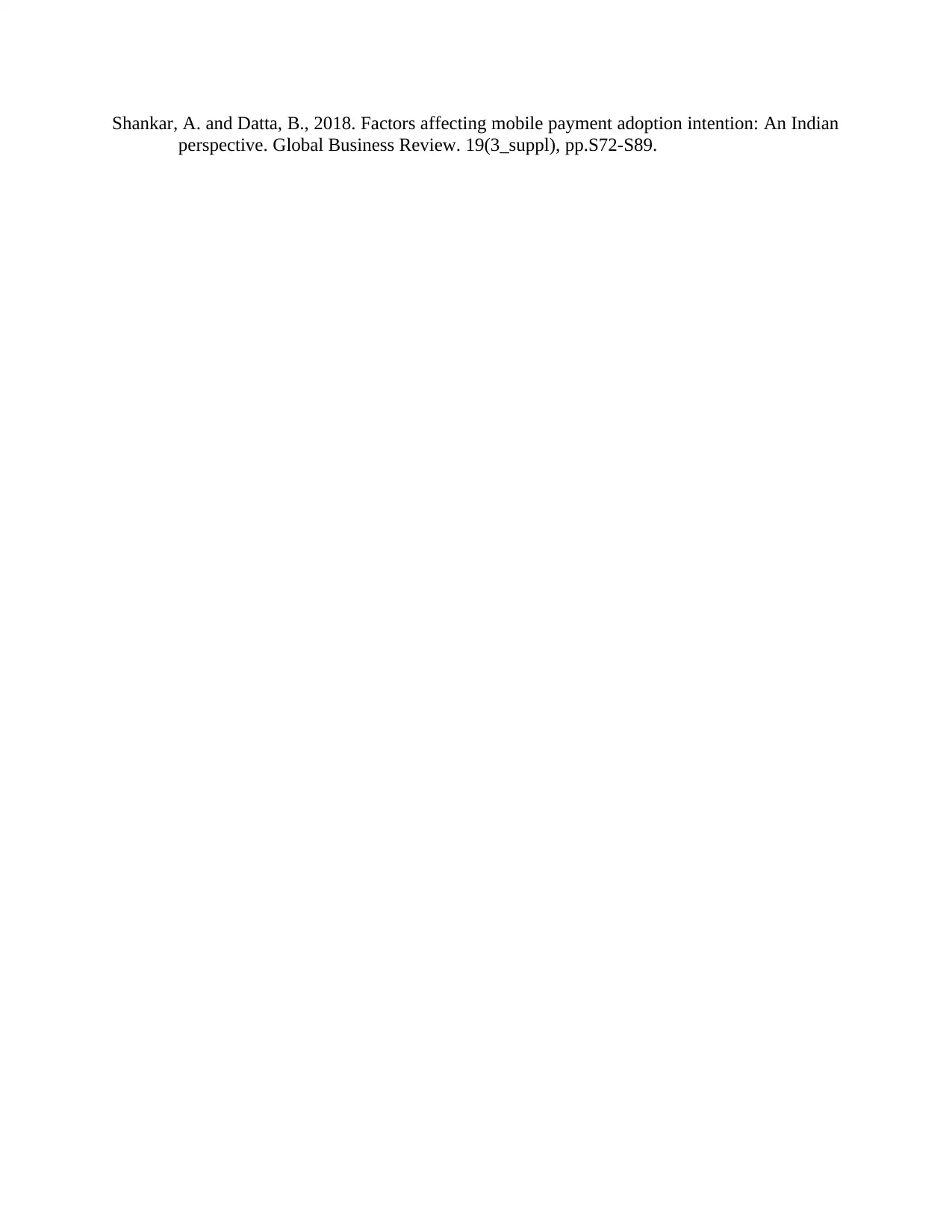
Shankar, A. and Datta, B., 2018. Factors affecting mobile payment adoption intention: An Indian
perspective. Global Business Review. 19(3_suppl), pp.S72-S89.
perspective. Global Business Review. 19(3_suppl), pp.S72-S89.
1 out of 10
Related Documents
Your All-in-One AI-Powered Toolkit for Academic Success.
+13062052269
info@desklib.com
Available 24*7 on WhatsApp / Email
![[object Object]](/_next/static/media/star-bottom.7253800d.svg)
Unlock your academic potential
Copyright © 2020–2025 A2Z Services. All Rights Reserved. Developed and managed by ZUCOL.



